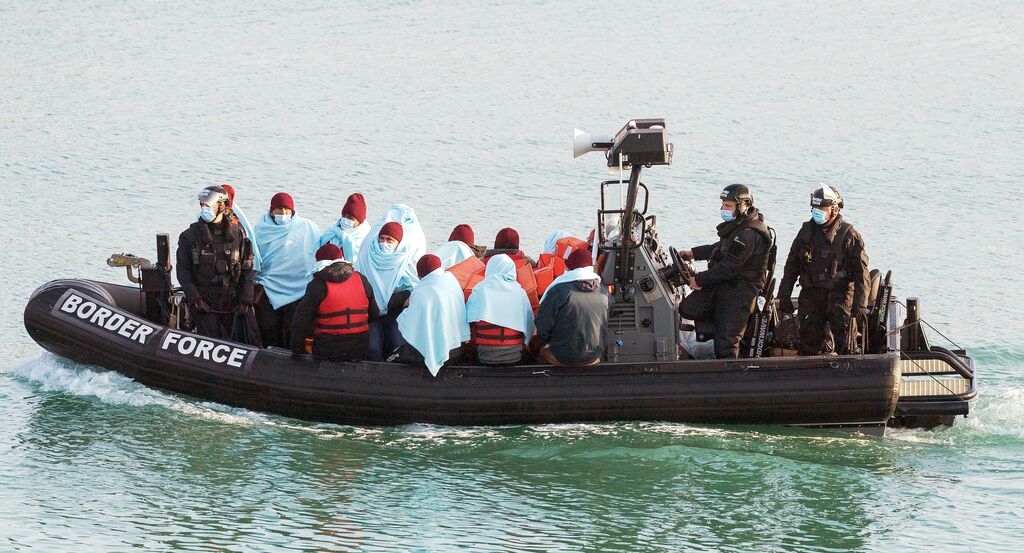Stop the boats? Smash the gangs? Here's why delivery is so important for the Government...

Contrary to what many might think about politicians, few go into politics with the intention of breaking promises, mismanaging the country, or being ineffective in the role.
MPs almost always want to deliver improvements for their constituents and the country at large. And yet delivery is the existential question hanging over politics today, with ever-increasing levels of mistrust in politicians and our major political parties.
Keir Starmer recognises this as much as anyone. The Labour manifesto in 2024 read: “At this election we can change Britain. We can stop the chaos, turn the page, and start to rebuild our country”.
On no issue is this truer than that of the small boat crossings. Promising, as Rishi Sunak did before him (“stop the boats”), to “smash the gangs”, Starmer has rightly recognised the political capital at the heart of the problem. Polling suggests that 40% of Reform voters would consider voting Labour should they be able to bring the numbers down.
And so, in welcome news for the Labour government after a rocky few weeks, Starmer announced a much-coveted returns agreement with France this week. The deal would see a one-in-one-out agreement, in which those crossing the channel on small boats are returned to France in exchange for asylum seekers who have been processed through legitimate routes heading the other way.
An individual making the illegal crossing would be returned to France, their identity recorded and logged as a deterrent, and would be returned again should they make another small boat attempt.
Starmer, and Home Secretary Yvette Cooper, see this deal as a crucial piece of the jigsaw by supposedly creating a deterrent and undercutting the business model of the people-smugglers driving the small boat crossings.
As is often the case, opposition parties were quick out of the blocks to criticise the agreement, with shadow Home Secretary, Chris Philp, labelling the plan “pathetic” which will offer “no deterrent at all”. Reform Leader Nigel Farage went further, slamming the agreement as a “humiliation for Brexit Britain”.
Details of the plan are hazy at this stage: journalists suggest that as few as 50 people a week might be returned to France, equating to only 1 in 17 that make the crossing.
Philp argued that “this deal will mean that 94% of illegal migrants crossing the Channel will get to stay”. “That is pathetic and will not deter anyone. By contrast, the Rwanda deterrent would have seen 100% of illegal migrants removed and that would have worked to deter people crossing the Channel.”
Reform too is arguing for a 100% rejection rate, with deportations promised for all who make the illegal crossing.
Home Secretary Cooper, however, was bullish about the new agreement, arguing it was simply one part of a wider series of coordinated reforms to address the issue. Cooper indicated that the hopes are this scheme, which will begin as a pilot, will be scaled up if successful and will work hand-in-hand with a series of other measures to bring the number of small boats down.
She also highlighted reforms to French law enforcement tactics which would see French police officers empowered to intervene in tackling the small boats whilst in shallow waters, alongside British legal efforts to crack down on illegal workers and employment. Labour has also attempted to find international partners and agreements to head this issue off at the source, through increased funding in border security efforts and the deployment of British law enforcement throughout Europe to help tackle gangs.
Throughout their time in office, Labour have maintained that “there is no single silver bullet” to this crisis, putting clear ground between their approach to the matter and the relatively simplistic claims of both the Conservatives and Reform.
Labour will indeed hope that these changes begin to pay off quickly, having been slammed for seeing the crisis grow during their first year in government. The Migration Observatory notes that there were 42,000 arrivals in the year ending 30 June 2025, a 34% increase on the year before.
In response, Starmer made an appeal this week about the importance of being pragmatic, rather than ideological: “We have to show that pragmatic politics is the way to deliver the results that matter for both of our peoples”. The BBC’s Chris Mason characterised it as a ‘plea for patience in an impatient world.’
And impatient the world is...
Immigration is currently neck and neck with the economy in the YouGov opinion tracker on most important issues facing Britain. YouGov also report that 78% of people think the government is handling the issue badly.
Even though the numbers involved in small boat crossings only make up 3-4% of overall immigration this issue cuts through in newspaper headlines and on social media, in part because it is far more visible. Day after day, images pour onto our screens of undocumented arrivals and you do not have to look hard to see just how far the Overton window has shifted on this issue.
There is now a political consensus about the importance of reducing immigration and stopping small boat crossings, and with the Tories’ record discredited by the surge in numbers on their watch, and Labour’s first year in office seemingly ineffective too, Farage is waiting in the wings to capitalise. Starmer argued this week, in a nod to the Reform leader, that "whilst we have been working hard to get a returns agreement, others have been simply taking pictures of the problem".
So, for Starmer, delivery really matters. But delivery also really matters for the state of politics in our nation.
Delivery is central to the core purpose of government. The government might have a noble ambition to institute and uphold public justice, but without competency and delivery the government will fail to discharge its responsibilities appropriately. Delivery matters. Border security matters. Fairness in the welfare system matters.
Reducing the numbers of small boats ought to matter, as a basic requisite of justice. Small boat crossings fuel people smuggling and human trafficking, organised crimes and gangs. It is right that a country knows who is coming in and who is leaving, and it is right that the asylum system should work well.
But delivery also matters because of what it means for government in this country.
The Conservatives face an uphill battle to reestablish credibility again after their fourteen years in office. Labour, one year in, are already beset with existential questions and having to justify their record in power. And if (as polling suggests) Reform gain enough seats to have a role in the next government, they too will be judged on their delivery.
Chris Mason writes, “what happens… if Nigel Farage was to win and he too was subsequently deemed to have failed? Where, they wonder, and in what political direction would the country turn in next?”
Only last month we had racially aggravated rioting in Ballymena. Last summer we had the Stockport riots which quickly spread across the country. Only this week an effigy of refugees was set on fire in Northern Ireland.
I do not wish to be alarmist, but there are some deeply concerning trends and attitudes swimming about just beneath the surface.
That though cuts to the heart of the limits of delivery as a political ambition.
Yes, generosity and open-handedness can be exploited and taken for granted; the government has a duty to ensure systems of support cannot be easily abused. But it is a pretty torrid reflection of our national character if the path to political stability rests not on the hard work of cultivating goodness and righteousness, but on ‘getting what we want’.
Character – and national character is no different – is truly revealed when things are going badly, when your back is against the wall, and the chips are down.
Some voices argue that we are in unprecedented times, that nothing works, and that all is going to the dogs; it is, they argue, essential that we act, that we break things, that we tear down, that we be free to act outside the normal rules of engagement with impunity because the times demand it. Don’t just reform the system; break the system.
Charity, generosity, and humility are dismissed as weak; nuance is seen as compromise; and pragmatism as cowardice, which avoids taking the radical action that our times demand.
The challenges we face are complex. But radical action can never be devoid of moral content.
I am for good government. I hope that the government might have success in shutting down organised crime and end the exploitation of people in need. I hope that the government does have success in managing basic border security. I hope that the government might have success in safeguarding the welfare system, and that those who are truly in need receive the help they need in a manner that is equitable and just.
But I also hope that the basic moral tenant, that all are made in the image of God and therefore hold intrinsic and immutable dignity, be they white or black or brown, be they Christian, atheist or Muslim, be they rich or poor, be they young or old, male or female, might ring loud and true.
We must hope that the government delivers. But we must also seek to reform our character as individuals and as a nation.
I pray that when the chips are down, and when times are tough, our instinct might not be to lash out, nor to seize and dominate, but towards a truly radical action: the radical act to love. To pray for our enemies, to love those who persecute us, to turn the other cheek, to be peacemakers, and to be merciful and pure in heart.
There is much debate about whether the UK is a ‘Christian’ country or not. Well we will know by examining how we behave when the government does not deliver? What qualities will we display when things go wrong?
“Blessed are the poor in spirit, for theirs is the kingdom of heaven. Blessed are those who mourn, for they will be comforted. Blessed are the meek, for they will inherit the earth. Blessed are those who hunger and thirst for righteousness, for they will be filled. Blessed are the merciful, for they will be shown mercy. Blessed are the pure in heart, for they will see God. Blessed are the peacemakers, for they will be called children of God. Blessed are those who are persecuted because of righteousness, for theirs is the kingdom of heaven.”
Jesus told us that these are the values of the kingdom of heaven.






